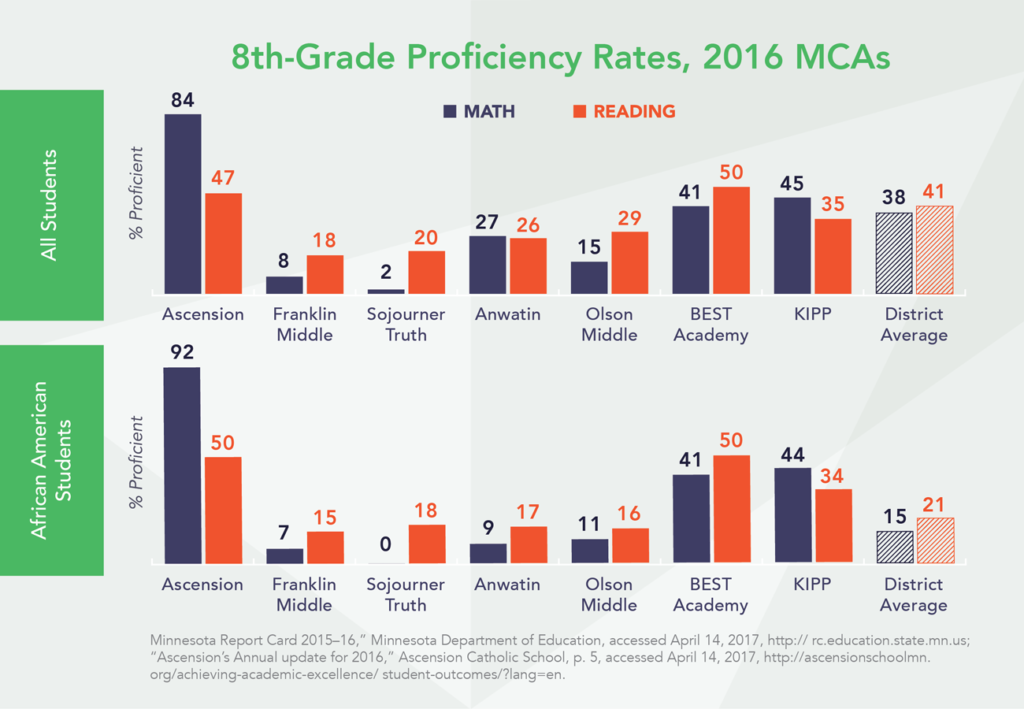Why We Support Expanding School Choice—If Done Right
By Brandie Burris-Gallagher
As Minnesota legislators debate if and how to create “Opportunity Scholarships” for low-income children to attend independent schools, I can’t help but share my perspective, because I know just how life-changing access to more educational options can be. And, as a Policy Director at EdAllies, where I’ve had the chance to research scholarship programs in other states, I know that Minnesota’s proposal can and must be improved (and offer specific suggestions in our brand new report). At the end of the day, I believe in the potential of a scholarship program—as long as equity, transparency, and accountability are top of mind for those who craft and implement it.
FAMILIES NEED MORE OPTIONS
My personal connection to educational inequity and school choice brings me to this work. My parents both graduated from Philadelphia’s Martin Luther King Jr. High School, which to this day is considered a last choice for students who aren’t lucky enough to gain admission to one of the city’s magnet programs or charter schools. Dissatisfied with their education, my parents knew they wanted better for my sister and me and took every opportunity to choose the school experience we needed and deserved.
At the time, school options for families like mine were few and far between. I was lucky enough to receive state assistance to enroll in a high-quality preschool, but as I advanced through my education it became more complicated. My family sometimes lied about our address so that I could access better schools. Eventually, in my sophomore year of high school, we moved into a neighborhood with amazing public schools. I didn’t have to lie or get lucky anymore; I finally had access to the education that had always been available to other kids.
Thankfully, families like mine have more opportunities today to choose the best school for their children. However, too much still falls to chance, zip code, or family income.
Given my own personal experience, I believe that if given a chance to succeed in a rigorous and engaging environment, every child is capable of greatness. And I believe it is shameful that we do not afford low-income students the educational opportunities already available to their more affluent, and largely white, peers.
IF DONE RIGHT, OPPORTUNITY SCHOLARSHIPS CAN HELP
These beliefs bring me to the conversation about the Opportunity Scholarship proposal currently being debated at the Minnesota Capitol. About a year ago, I met with a coalition of business leaders and parents in North Minneapolis who are frustrated with the offerings of their neighborhood schools because they want better for their children, like my parents did years ago. Noting that many local independent schools are outperforming district schools—for example, Ascension, highlighted below—and yet remain out of reach for too many families, they lamented that the state does little to level the playing field.

This legislative session, there has been an energized conversation about creating an Opportunity Scholarship program to provide low-income families scholarships to attend independent schools. While the proposal for Opportunity Scholarships has a well-intentioned goal of increasing access and opportunity for underserved families, I believe it can be strengthened. Through research, site visits, and interviews with policymakers and practitioners in states with scholarship programs similar to the one being considered in Minnesota, we have identified seven key components of any effective program and explained how to better align Minnesota’s proposal with these best practices.
No parents should ever have to lie, move, or simply hope for a better future for their children. In our urgency to provide new options for families, legislators should only establish a scholarship program after first learning from the challenges, successes, and lessons learned from states that have already paved the way. Our students deserve nothing less.
IT’S TIME TO ACT
As the Legislature moves into conference committees to finalize this year’s policy and budget priorities, I hope our policymakers will improve their model for Opportunity Scholarships, ensuring strong transparency for families and accountability for participating schools. Right now, tax conference committee members are meeting to finalize the proposal that will be sent to the Governor. It is time to act, because if we’re going to expand school choice for families, we have to get it right.

